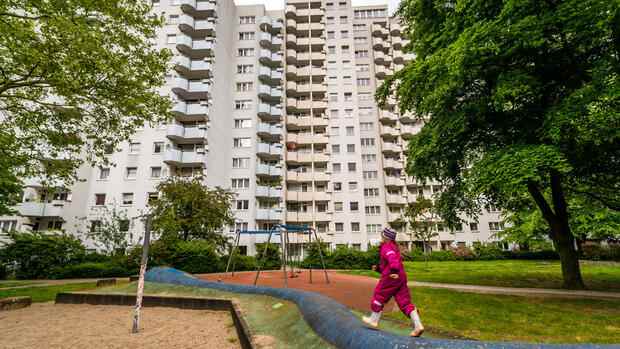Many people depend on support for their housing costs.
(Photo: imago images/Hoch Zwei Stock/Angerer)
Berlin When Federal Building Minister Klara Geywitz (SPD) visited the housing office in Berlin-Pankow last week, her department head Marco Schaum complained of his suffering: “I’m afraid that we will be overrun with applications,” he said, referring to the new housing benefit plus starts in January.
Because the federal government not only wants to increase the service by an average of 190 euros per month, but also expand the group of recipients from the current 600,000 to two million households. He simply does not have enough staff to be able to process the expected large number of applications in a timely manner, warned Schaum. And the housing office in Berlin-Pankow is not alone in this.
In many municipalities, applicants are already waiting months for their decision, sometimes even up to a year. So that no one gets into financial difficulties, the housing benefit offices have the opportunity to issue preliminary decisions in the first 24 months, said Geywitz.
In the labor administration, there is now a fear that employees who do not have enough money to pay the rent would rather go straight to the job center to apply for citizen benefit there. And that the job center employees ultimately have to pay for what the housing benefit offices cannot afford because of a hasty reform.
Top jobs of the day
Find the best jobs now and
be notified by email.
Law provides for moratorium
The housing allowance is a so-called priority benefit. If your own income is not enough to cover living expenses and rent, you should first check whether you are entitled to housing benefit. Only then would the unemployment benefit II or, from January, the new citizen’s benefit, probably come into effect.
At the same time, it would have to be checked in the case of recipients of basic security, whether they would not suddenly be entitled to benefits through the expansion of the group of recipients of housing benefit.
However, there is a moratorium in the law already passed by the Bundestag. According to this, the job center citizens who already receive basic security or who apply for it by June 2023 should no longer refer to the priority housing benefit. This is apparently intended to cushion the expected rush to the housing benefit offices.
According to the draft law, around 380,000 “changer households” are affected. The Confederation of German Trade Unions (DGB) criticizes that they are worse off if they are not checked for the – usually higher – entitlement to housing benefit. In addition, by switching to housing benefit, these people could avoid the “many obligations and conditions” imposed on them by the job centers.
In addition to the “rotating households”, there are a good million households that have not previously received any subsistence benefits and are now entitled to benefits for the first time as a result of the improvements in housing benefit. However, if they prefer to apply for citizenship benefits immediately because of the long processing and waiting times, the job center cannot reject them.
>> Read here: Hubertus Heil: The advocate for those left behind is fighting for his welfare state reform
Since the moratorium lasts half a year, a wave is building up in the job centers, which will lead to a heavy increase in workload by the middle of next year. Because then the employment administration has to check for the cases that have accumulated up to that point whether there is a claim to housing benefit instead of the entitlement to basic income from July 1st.
This is also interesting from the point of view of the service providers: because while the housing allowance is paid half by the federal government and half by the municipalities, the federal government pays the basic income alone.
criticism of the government
The reform is expected to clear the last parliamentary hurdle next Friday when it is passed in the Bundesrat. The Federal Council Committee for Urban Development, Housing and Regional Planning recommends that the state chamber approve the law, but at the same time it is sharply critical of the federal government.
According to the committee recommendation, Minister of Building Geywitz “largely failed to take up the various suggestions for reducing the administrative burden” on housing benefit. In addition, the chamber of the federal states should request the federal government in a resolution – albeit not legally binding – to postpone the entry into force of the law to April 1, 2023 “in order to make the implementation of the Housing Benefit Plus Act administrable”.
1.4
millions
additional households are to be entitled to housing benefits as a result of the reform. (Source: Ministry of Construction)
Construction Minister Geywitz knows the concerns. It is the “biggest reform of housing benefit in the history of the Federal Republic,” she said last week in Berlin-Pankow. “Normally, you would set aside two years for such a reform.”
On the other hand, applicants could only receive support once a corresponding law had come into force. And with the current rise in housing costs, there is no delay.
More: What the federal government is planning for the Hartz IV successor

